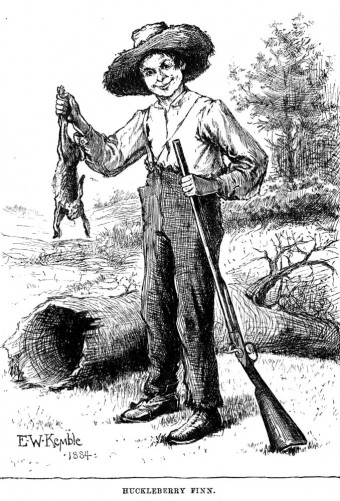This Day in History: February 18th- More Suited to the Slums than to Intelligent, Respectable People
This Day In History: February 18, 1885

“Sequels aren’t inherently bad-remember that Huckleberry Finn was a sequel to Tom Sawyer. But Twain understood what modern storytellers seem to have forgotten-a compelling sequel offers consumers a new perspective on the characters, rather than just more of the same.” -Henry Jenkins
On February 18, 1885, Mark Twain’s celebrated yet controversial book The Adventures of Huckleberry Finn was published and soon became known as one of the “great American novels.” In Ernest Hemingway’s opinion, it was fount of “all modern American literature.” He also went on to say, “there was nothing before. There has been nothing as good since.”
Twain had begun working on the novel in 1875, and wrote it, as he said, in “fits and starts,” not sure of the direction to take, sometimes considering dropping the project for good. He described the novel to his family as “a book which I have been fooling over for 7 years.”
The character of Huckleberry Finn was first introduced in Twain’s novel The Adventures of Tom Sawyer, released in 1876. The story describes the journey of a 13 year-old boy named Huck and his friend Jim, an escaped slave, on a raft down the Mississippi River. Jim is on the run to avoid being sold, and Huck is helping him get to Ohio – and hopefully freedom. The most memorable aspect of the novel is its satirical take on social attitudes of the era such as religion, racism and politics. In general, Huck finds Jim to be wise, generous and brave. More often than not, he observes white people behaving selfishly or violently, which leads the young boy to question the unfair and hypocritical standards of antebellum society.
This was pretty heady stuff a mere two decades after the Civil War and the Emancipation Proclamation. A library in Concord, Massachusetts banned the book a month after it was published, explaining.
The Concord (Mass.) Public Library committee has decided to exclude Mark Twain’s latest book from the library. One member of the committee says that, while he does not wish to call it immoral, he thinks it contains but little humor, and that of a very coarse type. He regards it as the veriest trash. The library and the other members of the committee entertain similar views, characterizing it as rough, coarse, and inelegant, dealing with a series of experiences not elevating, the whole book being more suited to the slums than to intelligent, respectable people.
This didn’t bother Twain at all.
Apparently, the Concord library has condemned Huck as ‘trash and only suitable for the slums.’ This will sell us another twenty-five thousand copies for sure!
Many other libraries followed suit, such as The Brooklyn Public Library who banned it for its “obscenity” and being poorly written. For instance, they specifically cited the fact that Twain had Huck Finn at one point “itch and itch.” Twain’s response was, as ever, marvelous:
I am greatly troubled by what you say. I wrote ‘Tom Sawyer’ & ‘Huck Finn’ for adults exclusively, & it always distressed me when I find that boys and girls have been allowed access to them. The mind that becomes soiled in youth can never again be washed clean. I know this by my own experience, & to this day I cherish an unappeased bitterness against the unfaithful guardians of my young life, who not only permitted but compelled me to read an unexpurgated Bible through before I was 15 years old. None can do that and ever draw a clean sweet breath again on this side of the grave.
Ironically, the novel that had once been known for controversially taking a strong stand against slavery and racism began to be criticized for its portrayal of African-Americans by the 1950s. Particularly the use of certain racially insensitive terms is highly offensive to some, despite the context and especially in a book that is required reading for approximately 70 percent of American students. There is talk of printing a version without the offending words included as “Huck Finn” is now in the public domain, but there is also a fair amount of controversy about that as well.
Despite the furor that has always surrounded it, The Adventures of Huckleberry Finn is an American classic, lauded by esteemed literary critics everywhere as a true masterpiece. Like its author, the incomparable Mark Twain, a.k.a. Sam Clemens, it is entertaining, controversial, and profound in equal measure.
If you liked this article, you might also enjoy our new popular podcast, The BrainFood Show (iTunes, Spotify, Google Play Music, Feed), as well as:
- Mark Twain and His Grandfatherly Hobby of Collecting Girls from 10-16 Years Old
- Mark Twain and Halley’s Comet
- Dr. Seuss Wrote “Green Eggs and Ham” on a Bet that He Couldn’t Write a Book with 50 or Fewer Words
- Who was the Real Mother Goose?
- Stephen King’s Children of the Corn was First Published in Penthouse Magazine
| Share the Knowledge! |
|





Quoting from this good article: “Like its author, the incomparable Mark Twain, a.k.a. Sam Clemens, it is entertaining, controversial, and profound in equal measure.”
I have a recommendation regarding a point of “style” …
When a second name is given and it is the person’s REAL name, a writer should not use, “a.k.a.” — an abbreviation that was formerly used almost exclusively before the aliases of criminals. Nowadays, its use has been extended for making references to any kind of alias or pseudonym/nom-de-plume/pen name. (“Sam Clemens” is not one of those.)
In this article, therefore, the writer should have chosen one of these options (or something similar):
1. … the incomparable Samuel Clemens (pen name: Mark Twain) …
2. … the incomparable Mark Twain [real name: Samuel L. Clemens] …
Thank you.